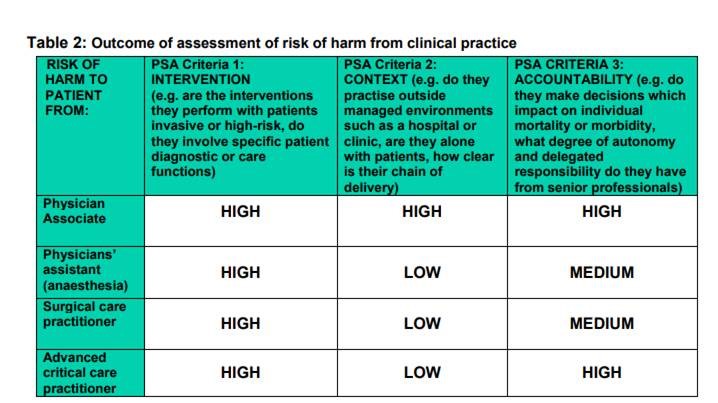Physician associates ‘pose high potential risk’ and should be regulated
Statutory regulation should be introduced for physician associates, the four UK health departments have proposed.
Physician associates, who are currently not obliged to register with a regulatory body, should undergo compulsory regulation, according to a consultation document released today by the DH.
The conclusion was reached based on an assessment of risk, taking in to account the types of interventions carried out by physician associates, their level of supervision and their level of interaction with potentially vulnerable patients.
The assessment, carried out by Health Education England and considered by all four of the UK’s health departments, concluded that patients are at high risk of harm from physician associates. The health departments therefore recommend the introduction of statutory regulation for the profession.
The consultation document said: ‘HEE’s assessment of risk reflects the wide ranging scope of the PA role including the provision of direct and interventional care to patients, the environments they work in (particularly primary care) and the level of direct supervision they are subject to.
‘For example, PAs are often alone with vulnerable patients and service users and can make autonomous diagnostic and treatment decisions without the immediate direct supervision of a doctor. In addition, the types of intervention they undertake can also be invasive such as performing diagnostic investigations.’
It listed potential harms associated with physician associates, and found them to be ‘high risk’ in every domain.
Health secretary Jeremy Hunt commented in 2016 that the only thing holding up legislature for the regulation of physician associates was finding a ‘parliamentary slot’ to deal with it with Government focussed on Brexit.
The consultation suggests either the General Medical Council or the Health and Care Professions Council as two potentially suitable bodies that could take on regulation of physician associates and welcomes views on which would be more appropriate.
Pulse previously reported that the DH were looking in to whether or not physician associates should be allowed to prescribe. The consultation recognises that while there is no a legal requirement for a profession to undergo statutory regulation before it is allowed to prescribe, the high-risk nature of prescribing means that the activity should be carried out by regulated professionals only. The process of expanding prescribing responsibilities could take several years and the DH will use the consultation to collect initial views on physician associate prescribing
The Government has committed to make 1,000 physician associates available to work in general practice by 2020 as part of its pledge to increase the primary and community care workforce by 10,000.
Pulse reported this week that education bosses are recruiting physician associate ‘GP ambassadors’ to promote and develop the new profession’s role in practices, and are offering up to £45,000 for recruits.
Visit Pulse Reference for details on 140 symptoms, including easily searchable symptoms and categories, offering you a free platform to check symptoms and receive potential diagnoses during consultations.














